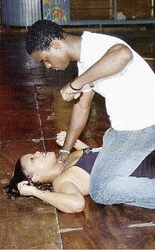Global campaign to end violence against women
Published: Monday | November 30, 2009

As the world commemorated the International Day for the Elimination of Violence Against Women on November 25, the United Nations was kicking off a '16 Days of Activism to End Violence Against Women' campaign. During this period, governments and civil society groups, will work to raise awareness about gender violence.
"Violence against women and girls is a very serious global pandemic," said United States Ambassador-at-Large for Global Women's Issues, Melanne Verveer, in response to questions posed by America.gov Facebook fans.
According to the United Nations Development Fund for Women (UNIFEM), up to six out of every 10 women, experience physical and/or sexual violence in their lifetime.
Exploited
Women are subjected to violence in many forms. "The trafficking of girls, children and women, even some men, is one of the terrible problems that afflict our world. They are bought and sold like they were products, and used for exploitation," Verveer said. "It is a very big problem in many places of the world. It is a modern-day version of slavery."
The three ps
Verveer said countries need to have laws ensuring that those who perpetrate violence against women will be punished, and to enforce those laws once enacted. The United States has the Violence Against Women Act (VAWA). The law is based on what Verveer called "the three Ps: protection, prevention and prosecution.
"We help countries train their police and judges so that people who perpetrate these crimes are punished. First and foremost, we have to deal with the problem of prevention. We have to make children aware," Verveer said. The office publishes an annual report on "what countries are doing or not doing that can be used by the citizens of those countries and governments to improve the situation," Verveer said.
Many organisations worldwide have set up programmes for the 16 Days of Activism campaign. According to the Facebook site, the goal of this activity is to "generate opinion and debate on words, vocabulary and images that are already in the public domain."


